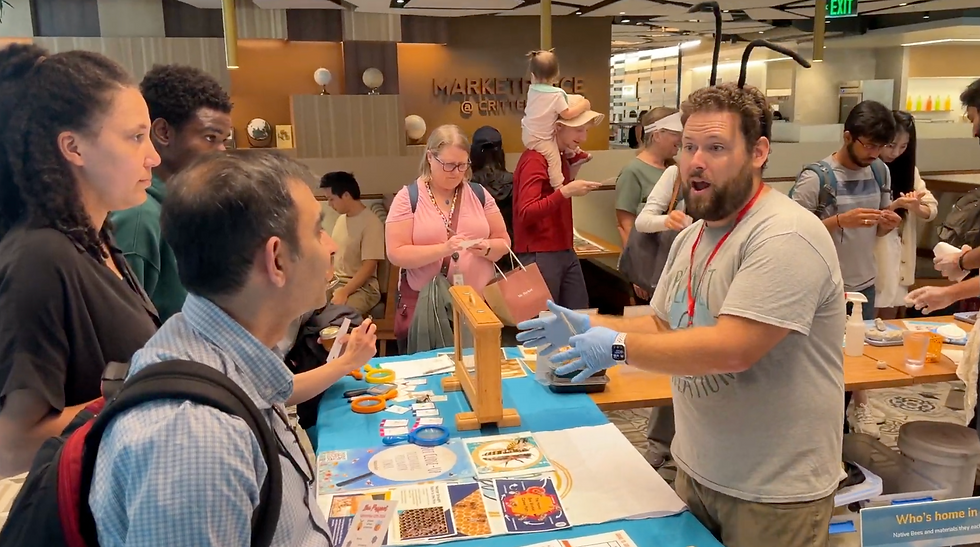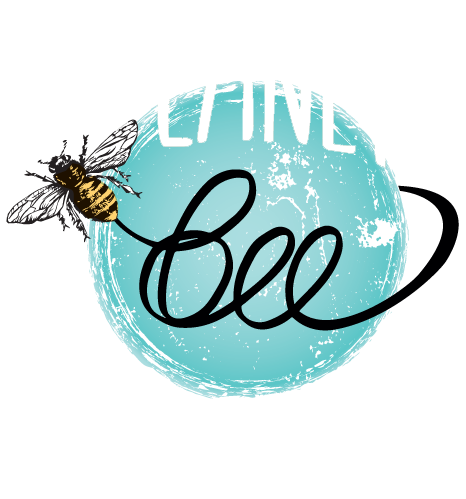Farewell to Peter Maxwell
- Melissa Marazas
- Dec 17, 2024
- 4 min read
Updated: Mar 6
A Member of Our Hive Who Inspired, Educated, and Connected

Peter Maxwell, our Program Manager & Beekeeper will be leaving Planet Bee Foundation this month. His time with the Planet Bee Foundation has been defined by his hands-on work with bees and his commitment to education. From managing hives across the Bay Area to teaching people of all ages about the vital role bees play in our ecosystems, Peter has used his passion for beekeeping to inspire others to take action in conservation.
As he transitions to new opportunities, we take a moment to reflect on his contributions and the mark he’s left on our organization. We caught up with Peter to find out what got him into beekeeping and how he’s witnessed the magical way bees bring people together through learning:

What sparked your interest in bees?
I’ve always been fascinated by social insects. It’s amazing how a colony of tens of thousands of creatures can all do separate tasks, in unison, without direction, all for the benefit and success of the collective. It’s like a symphony without a conductor.
What’s your favorite thing about working with bees?
The hive is an amazing space full of beautiful aromas, colors, and fun bee behavior to observe. When you are keeping bees, you have to slow down and focus on the moment, which is a source of tranquility, but time also flies by.

How many times have you been stung?
Hundreds in my six years of experience. At least 3-5 times a month or more.
How many bees have you impacted during your time at Planet Bee?
My conservative estimate is about 1.4 million honey bees.
What first inspired you to work with bees and join the Planet Bee Foundation?
I had been a hobbyist beekeeper for several years, and really felt like it was a calling that would bring me joy and enrich my life if I pursued it further. Planet Bee’s focus on education especially spoke to me as a mission I would value and feel compelled to participate in.
What does a typical day in the life of a PB beekeeper look like?
Settle on a route of hives to inspect, get your equipment ready, and hit the hives! Most of the routine hive inspections we do are about confirming whether hives have a healthy queen, are free of pests and disease, and have enough space to prevent swarming. It’s fun being a public-facing beekeeper because people are genuinely excited to see me and love to ask questions about the bees in their area.

Can you share a memorable moment or success story from your time teaching people of all ages about bee conservation?
I really enjoy all of the events where people of all ages get engaged and excited about bees and pollinators. It’s a subject that we all learn about at an early age, most of us never really think much about it afterwards.
What are some of the most common misconceptions people have about bees?
That bees are dangerous or something to be feared. Bees usually only sting when their colonies are being threatened, and most humans are never in that circumstance. The bees we usually see are foraging for food from flowers and have no interest in us at all. There is little evidence that suggests local honey will help you with your allergies, though if eating local honey seems to help, keep consuming it!

What advice would you give to someone interested in starting their journey in beekeeping or working in bee conservation?
Go to a local beekeepers association and talk to people! Almost every county or region in the USA has a local guild of beekeepers that are eager to answer questions and help others interested in honey bees.

As you transition to becoming a new parent, are there lessons from beekeeping or conservation that you hope to pass on to your child?
Do not fear insects, appreciate them! They are so valuable to our ecosystems and relatively harmless to humans. Respect and embrace science! Small actions make a difference. If we all planted more gardens, our communities would be more beautiful, and we might have a lot more pollinators and consequently more birds and other wildlife. When people interact with nature, we become more reverent of it.
Buzz Worthy Questions: This or That!
Honey or beeswax? Beeswax is super underrated and cool.
Bee suit: Fashion statement or necessary evil? Necessary good!
Queen bee or worker bee? Worker bees!
Sticky fingers or stung fingers? My entire life feels sticky after a season of beekeeping.
Honeycomb: Snack it or save it? Save it.
Better coworker: Bees or humans? Tie.
If bees could talk: Motivational quotes or endless complaints? Motivational quotes.
A Message from Our Founder, Debra Tomaszewski
It is with deep gratitude and admiration that we bid farewell to Peter Maxwell, our remarkable Program Manager, Community Educator, and Beekeeper at Planet Bee Foundation. Peter's unwavering dedication to bee conservation and his ability to connect with people through education has been truly inspiring. His leadership in our corporate team-building programs brought communities closer to nature while fostering teamwork and environmental stewardship. His legacy will live on in the countless lives he has touched, and we wish him nothing but success and joy in all his future endeavors. As Peter transitions to new adventures, we at Planet Bee want to thank him for his invaluable work in beekeeping and education. His dedication to conservation and his ability to engage and educate people of all ages will be missed.
Thank you again, Peter, for your hard work and dedication. Your impact will be felt for years to come, and we wish you all the best in your future endeavors!

JOIN OUR HIVE!
As we move forward, we are currently hiring a new beekeeper to join our team and continue our work of educating the public on the importance of bees and conservation. If you are passionate about working with bees and educating others about the natural world, we’d love to hear from you! [Click here to learn more!)




